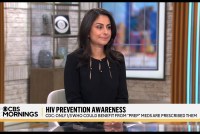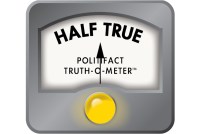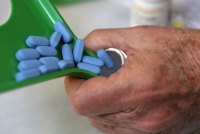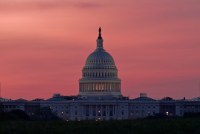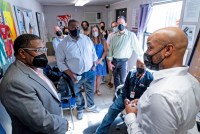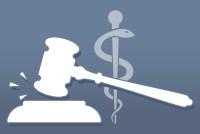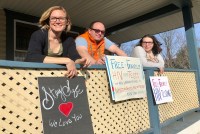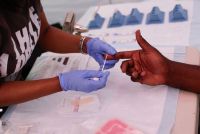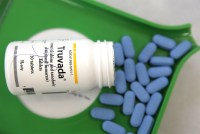Latest KFF Health News Stories
Watch: Many Americans Are Unaware of HIV Prevention Medication
Some Americans mistakenly believe medication to prevent HIV transmission through sex is just for certain groups such as gay men, but anyone who’s at risk for contracting HIV through sex could benefit.
Do Republican Spending Cuts Threaten Federal HIV Funding? For Some Programs, Yes.
Spending cuts proposed by a Republican-led House subcommittee would cut millions from HIV-related spending.
US to Cover HIV Prevention Drugs for Older Americans to Stem Spread of the Virus
The government has proposed that Medicare fully cover preexposure prophylaxis drugs that prevent HIV, a change that could help America catch up with nations in Europe and Africa that are on track to end new infections decades before the U.S. under its current approach.
Prevención del VIH: proponen que Medicare cubra PrEP para adultos mayores
Según el plan de la administración Biden, Medicare cubriría el costo total de los medicamentos de profilaxis previa a la exposición, que previenen la transmisión del VIH.
PrEP, a Key HIV Prevention Tool, Isn’t Reaching Black Women
New HIV infections occur disproportionately among Black women, but exclusionary marketing, fewer treatment options, and provider wariness have limited uptake of preexposure prophylaxis, or PrEP, drugs, which reduce the risk of contracting the virus.
What the Health? From KFF Health News: Countdown to Shutdown
Congress appears to be careening toward a government shutdown, as a small band of House conservatives vow to block any funding for the fiscal year that begins Oct. 1 unless they win deeper cuts to health and other domestic programs. Meanwhile, former President Donald Trump continues to roil the GOP presidential primary field, this time with comments about abortion. Alice Miranda Ollstein of Politico, Rachel Cohrs of Stat, and Tami Luhby of CNN join KFF Health News chief Washington correspondent Julie Rovner to discuss these issues and more. Also, for “extra credit,” the panelists suggest health policy stories they read this week they think you should read, too.
In Move to Slash CDC Budget, House Republicans Target Major HIV Program Trump Launched
Republicans in Congress have proposed substantial cuts to the budget of the Centers for Disease Control and Prevention, taking aim at one of former President Donald Trump’s major health programs: a push to end the HIV epidemic in the U.S.
What the Health? From KFF Health News: Welcome Back, Congress. Now Get to Work.
Congress returns from its summer recess with a long list of tasks and only a few work days to get them done. On top of the annual spending bills needed to keep the government operating, on the list are bills to renew the global HIV/AIDS program, PEPFAR, and the community health centers program. Meanwhile, over the recess, the Biden administration released the names of the first 10 drugs selected for the Medicare price negotiation program.
Need to Get Plan B or an HIV Test Online? Facebook May Know About It
Twelve of the largest drugstores in the U.S. sent shoppers’ sensitive health information to Facebook or other platforms, according to an investigation by The Markup and KFF Health News.
¿Se podrá cumplir con la meta de terminar con la epidemia de VIH para 2030?
Debido a las interrupciones de la pandemia, los funcionarios federales no han tenido estimaciones sólidas de nuevas infecciones o el número de personas que viven con VIH desde finales de 2019.
US Officials Want to End the HIV Epidemic by 2030. Many Stakeholders Think They Won’t.
The federal government’s ambitious plan to end the HIV epidemic, launched in 2019, has generated new ways to reach at-risk populations in targeted communities across the South. But health officials, advocates, and people living with HIV worry significant headwinds will keep the program from reaching its goals.
La decisión podría afectar los exámenes de detección sin copago y servicios preventivos similares que la mayoría de los estadounidenses con seguro tienen como parte de sus planes de salud.
Judge’s Decision Would Make Some No-Cost Cancer Screenings a Thing of the Past
A U.S. District Court ruling overturned the section of the Affordable Care Act that makes preventive health services — from colonoscopies to diabetes screenings and more — available at no cost to consumers.
HIV Outbreak Persists as Officials Push Back Against Containment Efforts
Research shows offering clean syringes to people who misuse IV drugs is effective in combating the spread of HIV. But an epidemiologist and advocates say state and local officials in West Virginia, home to one of the worst HIV outbreaks in recent years, have taken measures that render syringe exchange less accessible.
Court Ruling May Spur Competitive Health Plans to Bring Back Copays for Preventive Services
The Affordable Care Act required that health insurers provide many medical screenings and prevention services at no out-of-pocket cost to health plan members. But insurers and employers may consider adding cost sharing for preventive services now that a federal court ruled the ACA’s mandate is unconstitutional.
KHN’s ‘What the Health?’: Judge Takes Aim at the Affordable Care Act’s Preventive Care Benefits
A federal judge in Texas — the same one who tried to strike down the Affordable Care Act as unconstitutional in 2018 — has ruled against some of the ACA’s preventive benefits, including the requirement that employers cover medication to prevent HIV. Meanwhile, the U.S. Department of Veterans Affairs tries to make abortions slightly more available to veterans and their dependents. Alice Miranda Ollstein of Politico, Sarah Karlin-Smith of the Pink Sheet, and Joanne Kenen of the Johns Hopkins Bloomberg School of Public Health and Politico join KHN’s Julie Rovner to discuss these issues and more. Also this week, Rovner interviews KHN’s Lauren Sausser, who reported and wrote the latest KHN-NPR “Bill of the Month” installment.
A Needle Exchange Project Modeled on Urban Efforts Aims to Save Lives in Rural Nevada
Five years after HIV tore through a rural Indiana town as a result of widespread drug use, a syringe and needle exchange program was set up in rural Nevada to prevent a similar event.
Critics Worry Government Surveillance of HIV May Hurt More Than It Helps
Some people living with HIV and some state health officials are raising concerns about part of the federal effort to end the HIV epidemic: a new technology that analyzes blood samples to find emerging outbreaks. The critics say it’s too invasive and stigmatizing and might not be more effective than older public health approaches.
Sen. Orrin Hatch’s Legacy Tracks the GOP’s Evolution on Health
The man who forged a successful working relationship with Democratic health giants, such as Sen. Edward Kennedy and Rep. Henry Waxman, fell back on his deep conservative roots as opposition grew to the Affordable Care Act and the administration of President Barack Obama.
La medicación para prevenir el VIH debe ser gratis, pero las aseguradoras siguen cobrándola
Una norma federal estableció que los pacientes no debían pagar por la medicación para prevenir el VIH. Pero las aseguradoras siguen enviando facturas por los fármacos y servicios médicos asociados.



